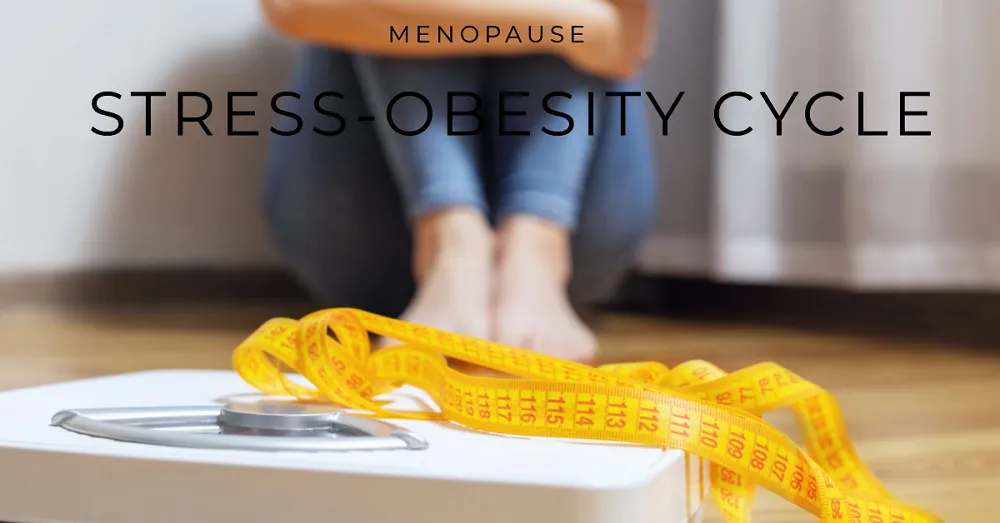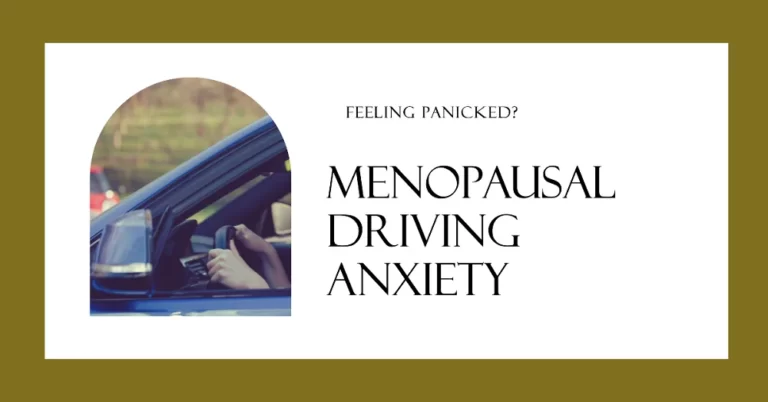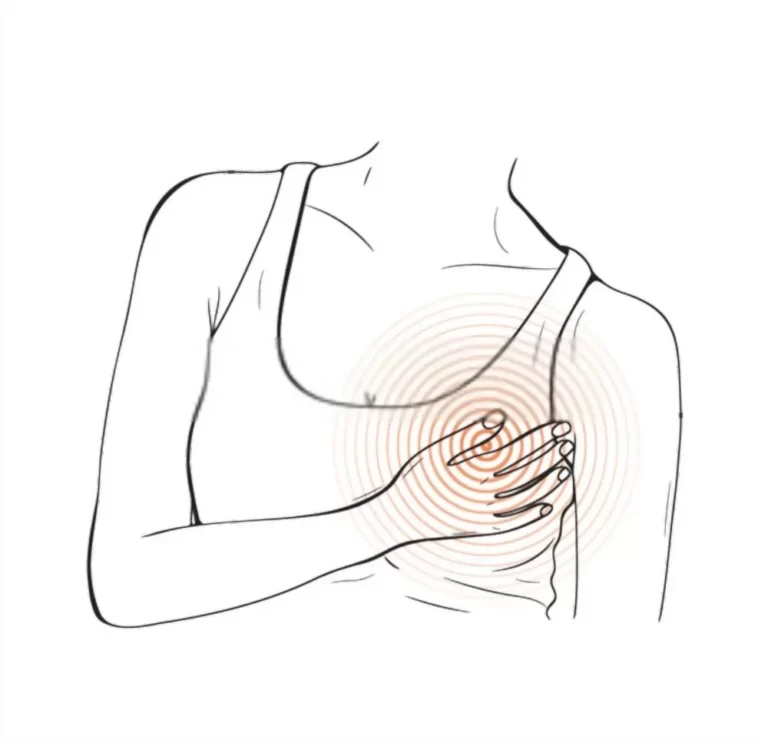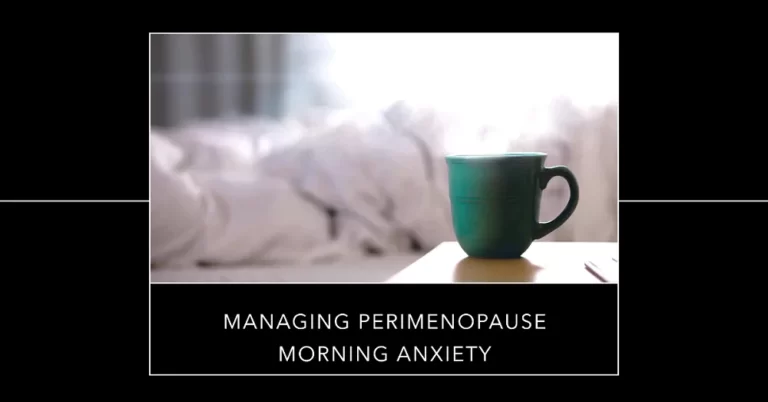How To Deal With Depression, Menopause And Weight Gain In Your 40s And Beyond? Overcoming the Stress-Obesity Cycle
Menopause is a natural part of the aging process for women that occurs when their ovaries stop producing eggs and hormone levels decrease significantly. There are a bunch of physical and psychological side effects, like anxiety, depression, and weight gain, that can impact an individual’s health and well-being.
To prevent and intervene against obesity among midlife women, it is crucial to understand the mechanisms that cause weight gain. The decrease in female steroid sex hormone production during menopause contributes to drastic metabolic changes, including a decreased basal metabolic rate, increased fat deposition, and distribution of body fat to the abdomen.
People use eating as a coping mechanism when stressed, but it can lead to overeating and weight gain. Among menopausal women, stress eating is when emotions influence food intake, causing weight gain.
This article explains how stress eating plays a role in depression, menopause, and weight gain among women experiencing menopause. By providing practical tips and strategies, we aim to equip you with the tools to manage these symptoms and improve your overall well-being.
Now let’s dive in and figure out how to handle these tricky issues in your 40s and beyond.
Factors Contributing to Menopause Weight Gain
Body mass index (BMI) greater than or equal to 30 is defined as obesity, and it is not uncommon for women to experience weight gain in the perimenopausal period.
Studies suggest that some of the factors contributing to menopause-related weight gain include age, estrogen levels, lifestyle behaviors such as diet and exercise, genetic predisposition, and metabolic issues.
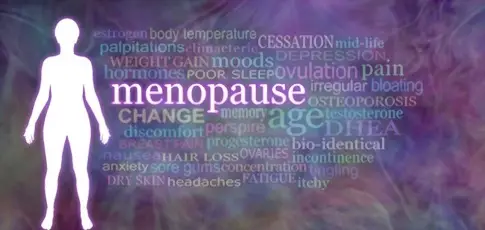
Let’s discuss each of these factors in more detail.
Effect of Estrogen
Weight gain is a common complaint among women who are undergoing menopause. Many women notice they are gaining weight, particularly around their midsection, even though they haven’t changed their diet or exercise routine.
This can be frustrating and lead to helplessness, but it’s important to understand that hormonal changes are occurring within the body, causing this weight gain. During menopause, the body’s estrogen levels decline.
Estrogen is an important hormone that plays a role in many bodily processes, including regulating metabolism and fat storage. Estrogen helps the body regulate fat storage by controlling metabolic processes such as how quickly food is digested, how many calories are burned, and regulating fat distribution throughout the body.
When estrogen levels are high, fat tends to be stored in the hips and thighs. However, fat tends to be stored in the midsection when estrogen levels decline.
Lower estrogen levels can also cause the body to slow down its metabolic rate, meaning that it doesn’t burn calories as quickly and fewer calories are burned throughout the day. This can lead to weight gain without increased physical activity or decreased caloric intake.
Age-related Metabolism Changes/Slowdown of Metabolism
Age slows down our metabolism and makes us less efficient at burning calories. Even if we eat the same amount, we may gain weight as our metabolism slows.
After age 30, our metabolism slows down by about 5-10% every decade. We may find it harder to maintain a healthy weight as we age.
Decreasing muscle mass and metabolism are common consequences of advancing age. It gets harder to keep muscle mass as the body’s hormonal balance shifts, resulting in a lower metabolic rate.
Natural aging also leads to a decrease in muscle-building hormones and appetite regulation. Body fat can increase from these changes, so you gain weight.
Genetic Factors
Menopause weight gain is a common issue among women, and recent research suggests that genetic factors may play a significant role in this. Women with a family history of obesity or metabolic syndrome are more at risk of gaining weight during menopause.
This vulnerability could be due to inheriting specific genes that cause a more rapid muscle loss and metabolism decline. Unfortunately, shedding these extra pounds can be more challenging for women due to their genetic makeup.
Some genes, such as certain estrogen receptor polymorphisms, can significantly decline muscle mass and metabolism, contributing to weight gain during menopause. Although not all women will experience this, those who do will likely find it difficult to lose weight despite exercise and diet modifications.
Consulting with a professional can provide valuable insight into the necessary steps to maintain healthy body weight, especially when their genetics are not in their favor.
Lifestyle Factors
Weight gain during menopause can also be attributed to lifestyle habits. Poor dietary choices, lack of physical activity, and a sedentary lifestyle can contribute to weight gain during menopause.
- Unhealthy Eating Habits
Consuming too much-processed food, drinking too much alcohol, smoking cigarettes, or living a sedentary lifestyle can all lead to menopausal weight gain. The more energy-dense foods you eat, like cookies, cakes, chips, and other processed snacks, the more calories you consume.

An unhealthy diet can increase your risk of heart disease and diabetes. Many people in their 40s and beyond have unhealthy eating habits because they use food to cope with difficult emotions.
When we hit midlife and menopause, we face new challenges. Our bodies go through physical and hormonal changes, plus we gain weight and feel down.
It’s no surprise we turn to food for comfort when we’re stressed. Indulging in comfort food and unhealthy treats can temporarily relieve stress and anxiety, but these habits can easily become habitual.
It can trigger a never-ending cycle of feeling bad about our weight and emotional health. Besides skipping meals, not getting enough nutrients throughout the day can also affect your weight and metabolism.
- Lack of Exercise/ Physical Inactivity
Lack of exercise can lead to aging-related declines in muscle mass and metabolism. People in their 40s and beyond may experience decreased physical activity and increased sedentary behavior because of increased responsibilities or other lifestyle changes.
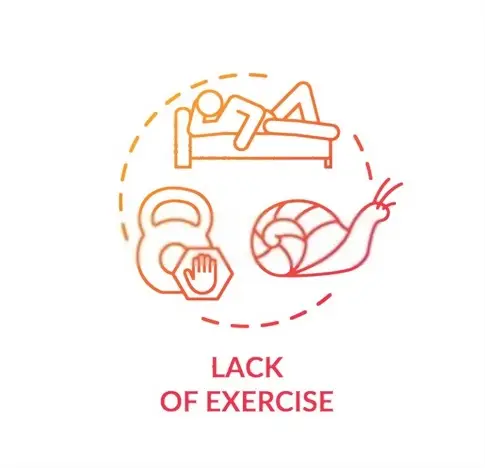
Social media can also decrease motivation to exercise since people compare themselves to others instead of focusing on themselves. Physical inactivity can make you gain weight because it doesn’t challenge the body to maintain a healthy weight.
- Inadequate Sleep
Sleep deprivation can have serious health consequences. Lack of sleep can cause fatigue, inability to concentrate, memory problems, decreased performance at work or school, and increased stress hormones.
As well as increasing appetite, decreasing physical activity, causing hormone imbalances, and gaining weight. It can also make your body less able to recover from exercise-related activities, leading to fatigue and low motivation.
- Chronic Stress
Stress can increase cortisol production, a hormone the body produces in response to stress. High cortisol levels can lead to fat storage, weight gain, and increased appetite and cravings.
Chronic stress can also cause hormonal changes that can decrease libido, make sleeping harder, and worsen mood swings. Stress eating and emotional eating are also common in chronic stress patients.
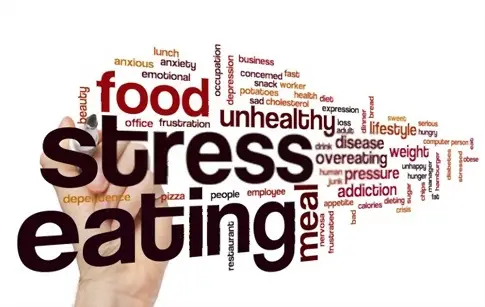
Stress Eating is a pattern of behavior in which an individual eats to cope with stress or difficult emotions. It can make you eat more calories and gain weight.
It’s been proven that stress-eating increases body mass index (BMI) and abdominal fat, which are linked to heart disease. Compared to pre-menopausal women, post-menopausal women are more likely to have weight-related health problems.
Link Between Menopause Weight Gain and Depression
Depression and weight gain during menopause are interlinked, with both being potential risk factors for developing the other. According to the National Institute of Mental Health, the prevalence of depression increases from 8% in women in their 40s to nearly 15% in women in their 50s and beyond.

Depression can cause a lack of motivation, unhealthy coping mechanisms, and disordered eating patterns, exacerbating weight gain and increasing the risk of obesity-related diseases such as metabolic syndrome, diabetes, and heart disease. Stress eating is a significant contributor to depressive symptoms.
Women often feel out of control and frustrated with their appearance, leading to psychological issues like depression and distress. To foster overall mental health, it is vital to be mindful of the psychological effects associated with menopause-related weight gain.
Link Between Menopause Weight Gain and Anxiety
Menopause-related weight gain can trigger anxiety in women due to hormonal imbalances and changes in appetite, metabolism, and food cravings. As a result, emotional triggers can lead to feelings of anxiousness, depression, and low self-esteem.
Research has shown that women in their 40s and beyond are more likely to experience anxiety during menopause than at any other time. This is due to the complex and multifaceted hormonal fluctuations, social isolation, and emotional upheaval that come with this stage of life.
Coping with these changes can be challenging, leading to stress and increased appetite, which can cause weight gain.
The Role of Weight Gain in the Development of Depression
As menopause progresses, hormonal imbalances associated with weight fluctuations can cause distress in women. The connection between weight gain and depression is widely accepted, as the stigma of being overweight can lead to emotional eating and depression.
Moreover, depression can affect hormone levels, causing an increase in appetite and weight gain, which further contributes to depressive symptoms. This is a vicious cycle that individuals need to be aware of to prevent long-term mental health problems.
Knowing this link is crucial in addressing such issues.
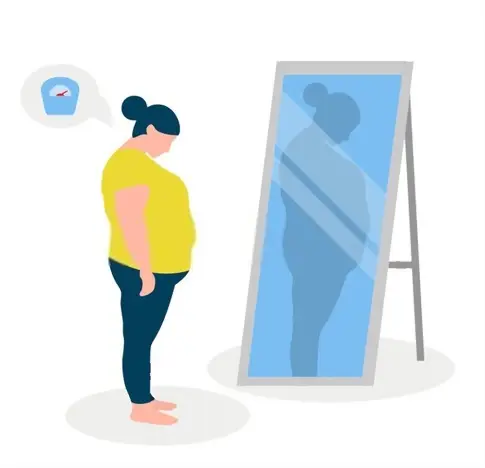
The Role of Weight Gain in the Development of Anxiety
Weight gain can contribute significantly to the development of anxiety, particularly when it occurs rapidly. This issue can be especially challenging during menopause due to hormonal changes that lead to increased cravings and difficulty controlling weight.
Social pressures associated with weight gain can also add to anxiety and insecurity, making it challenging for individuals to cope with this change. It’s crucial to recognize the relationship between body image and mental health.
Poor body image, body shaming, and fat shaming are all components that contribute to low self-esteem and may directly impact an individual’s mental health. A lack of body confidence frequently leads to depression and anxiety, making it crucial to address these issues to improve mental health overall.
As a result, it’s essential to take weight gain seriously and handle it appropriately to ensure better mental health outcomes for individuals in their later years.
Managing Menopause Weight Gain and Depression
If you’re gaining weight during menopause, you should take proactive measures to manage it. Menopause-related weight gain and depression can be managed with some lifestyle changes and appropriate medical treatment.
Let’s dig in:
Lifestyle Interventions
First of all, it is essential to maintain a healthy lifestyle routine during this period. So, what can you do to keep in shape?
Healthy Eating Habits
Consuming a balanced diet is akin to constructing a strong foundation for physical and mental well-being in the later stages of life. Eating healthy is essential for maintaining a healthy weight and combating depression and menopause symptoms.
To ensure success in this endeavor, it is important to adhere to three key principles:
Smart snacking, portion control, and mindful eating.
- Smart Snacking includes replacing unhealthy snacks with nutritious ones. Swap out those unhealthy treats for some nutritious alternatives.
Think crunchy nuts, flavorful seeds, refreshing fruits and vegetables, and tasty yogurt.
- Portion Control is another key principle. It involves eating smaller meals throughout the day and avoiding overeating.
Rather than one big meal, break it down into several smaller and more manageable servings. This can help to sustain levels for longer periods of overfeeding oneself and helps to regulate any changes in hormone levels that can trigger cravings.
- Mindful Eating means being aware of your body’s hunger cues and eating only when starving rather than getting carried away with cravings. Awareness of how much you eat and savoring every bite. This allows for better digestion, which helps.
To manage the stress eating that often comes with menopause, it is important to identify the emotional triggers that may be causing the urge to snack. By following these principles, individuals can ensure that their dietary habits are properly aligned with their physical and mental health needs.
Regular Physical Activity and Glucose Regulation
Regular physical activity is important to maintaining a healthy lifestyle in any part of life. Exercise helps to reduce stress and depression, as well as promoting better digestion and sleep.
Here are some tips on the best exercise choices to help you lose weight and maintain it:
1. Strength training: Building muscle mass is critical as you age. It helps boost your metabolism and maintain bone mass. Strength training in your workout regimen can be done using weight machines, dumbbells, exercise bands, yoga, or gardening.
2. Low-impact aerobics: These exercises are suitable for maintaining heart and lung health. Walking is one of the best aerobic exercises you can do anytime, anywhere.
Other aerobic exercises include swimming, cycling, aerobics, tennis, and dance. Exercise moderately for at least 30 minutes for most, if not all, days of the week.
3. Active lifestyle: Anytime you can sneak an activity into your day, do it. Wash the car, play hide and seek with your kids or grandkids, and engage in activities that get your heart pumping.
For those in the later stages of life, focusing on low-impact exercises that can be done without straining the body, such as walking, swimming, or cycling, is important. Even simple gardening or house cleaning can help burn calories.
It can help to reduce menopause symptoms and weight gain while also decreasing the risk of developing certain diseases, increasing energy levels, improve mental health.
It also boosts serotonin levels in the brain, which further helps reduce depression and anxiety.
4. Exercise precautions:
Before starting a new exercise program-
- Talk to your doctor.
- Choose an activity you enjoy, and consider finding an exercise partner to motivate you. Social support from family and friends can be a great motivator for regular exercise and can make the process more enjoyable.
- Get supportive shoes that are right for your activity.
- Finally, pick a start date and begin.
Regular physical activity not only offers physical benefits for women experiencing menopause depression but can also help regulate glucose levels and improve insulin sensitivity. This is particularly important because too much glucose can lead to weight gain, and insulin promotes this fat storage.
The good news is that regular exercise helps to lower insulin, decreasing the chances of gaining weight. During exercise, muscle cells absorb glucose through the GLUT4 transporter protein, improving glucose regulation, insulin action, glucose disposal, and muscle glycogen storage.
But it’s not just about the physical benefits. Exercise has also been shown to be an effective way to reduce stress and anxiety, both common symptoms of menopause depression.
Exercising triggers the release of endorphins in the brain, which can help us feel good and ease the negative feelings associated with menopause. By embracing a balanced diet and lifestyle incorporating regular physical activity, we can maintain overall health and prevent health complications from poor glucose metabolism.
Adequate Sleep
Adequate sleep is essential for maintaining optimum physical and mental health, with its restorative powers likened to a ‘fresh start’ each day. Poor sleep can lead to many issues, including weight gain, depression, and fatigue.
To ensure you get adequate sleep every night, it is important to practice good sleep hygiene. Such as:
- Avoiding screens like TVs, smartphones, and tablets before bed, engaging in calming activities before bed, and setting a consistent bedtime routine.
- Ensure adequate nutrition, as inadequate nutrition can lead to poor sleep. To ensure adequate nutrition, it is important to limit processed foods, increase the intake of whole grains, fruits, and vegetables, and reduce the intake of caffeine and alcohol.
- Wear loose, comfortable clothing to bed and invest in quality bedding.
- Finally, it is important to limit social media usage, as excessive use of social media can interfere with sleep.
Incorporating these tips into your sleep hygiene routine will give you the best possible chance of getting a good night’s rest. Sleep can help reduce stress and anxiety, improving mental health and well-being.
Medical Interventions
Medications, therapy, or some combination of the two is often the first line of treatment recommended for those struggling to manage symptoms that are not responding to lifestyle changes alone. It is important to understand that every individual is unique and that treatment plans should be tailored to meet their needs and symptoms.
Seeking the guidance of a healthcare professional is key to developing a comprehensive plan that will produce positive results.
- Hormone replacement therapy (HRT) may be prescribed for women experiencing symptoms of menopause, such as hot flashes, mood swings, and difficulty sleeping. HRT involves the administration of estrogen and progesterone to help restore hormonal balance and reduce the severity of symptoms.
- Anti-depressant medication may be prescribed for those suffering from depression, which can present relatively suddenly or can linger from earlier in life. These medications can help to increase the levels of certain neurotransmitters in the brain, correcting chemical imbalances that can contribute to depression.
- Psychological therapies such as cognitive behavioral therapy and psychotherapy can be incredibly effective in helping individuals manage the complex symptoms of middle age.
Cognitive behavioral therapy involves working with a trained therapist to identify negative thought patterns and replace them with more positive, empowering thoughts and behaviors. Psychotherapy aims to help people better understand their emotions and how they impact their daily lives. These therapies can be powerful tools for improving their overall emotional health.
Psychological Interventions
Psychological interventions such as cognitive behavioral therapy (CBT) and mindfulness can be beneficial in helping to manage the symptoms of depression and anxiety associated with menopause.
- Cognitive-behavioral therapy
Utilizing techniques such as problem-solving and goal-setting, cognitive-behavioral therapy (CBT) can help individuals identify and modify maladaptive behaviors contributing to their current circumstances. Cognitive-behavioral therapy is an evidence-based approach to mental health treatment that effectively reduces symptoms of depression, anxiety, and other psychological issues.
CBT allows individuals to focus on their thoughts, feelings, and behaviors to create positive life changes. The approach encourages individuals to become aware of their negative self-talk and to use cognitive restructuring to challenge unhelpful thinking patterns.
CBT also promotes lifestyle changes that can reduce symptoms of depression, menopause, and weight gain. Through CBT, individuals can learn to make healthier choices, set realistic goals, and create a plan of action to help them reach their goals.
Individuals can gain the skills and self-confidence needed to make lasting changes through the process.
- Mindfulness-based interventions
Moving on from cognitive-behavioral therapy, mindfulness-based interventions are another essential tool for dealing with depression, menopause, and weight gain in your 40s and beyond.
Mindfulness-based interventions focus on creating a mind-body connection through self-care practices and positive self-talk.
Specifically, these interventions involve:
• Being mindful of one’s emotions, physical sensations, and thoughts
• Increasing awareness of the present moment
• Noticing the body’s physical sensations and emotions
• Cultivating non-judgmental awareness
• Developing an attitude of acceptance
These interventions are designed to help individuals become more aware of their inner world and learn to accept their thoughts and feelings without judgment. By doing so, one can become less reactive to difficult emotions, helping them to create a more positive outlook on life.
Additionally, mindfulness-based interventions can help build self-compassion, a powerful tool for dealing with difficult periods in life.
- Support Groups
Support groups provide a safe space for individuals to share their experiences and receive support from others in similar situations, allowing them to feel a sense of connection and understanding. Through peer support, individuals can provide feedback and share advice, help each other cope with difficult emotions, and learn self-care strategies to manage depression, menopause, and weight gain.
In support groups, individuals can learn to identify their emotional needs, create healthy coping strategies, and build strong relationships with their peers. They can also practice self-care activities, such as yoga, meditation, or journaling, to help manage difficult emotions.
By engaging in these activities, individuals can understand their feelings better and develop skills to manage their emotions and depression, menopause, and weight gain.
Alternative Therapies
Many people have succeeded with holistic alternative therapies that address physical, emotional, spiritual, and social needs, helping them reduce menopausal depression and weight gain issues.
Herbal Remedies
Herbal remedies offer a non-invasive option to address various physiological and psychological changes experienced due to age. They may provide an acceptable alternative to pharmaceuticals for those concerned about side effects.
Herbal teas can help reduce stress, anxiety, and depression.
Herbal supplements are a natural alternative to pharmaceuticals that can provide essential vitamins and minerals to restore hormonal balance and reduce stress, anxiety, and depression. Depending on your needs, you can choose herbal supplements like weight loss, stress relief, sleep support, or menopause-associated symptom suppressors.
NuviaLab Meno boosts energy, helps you fall asleep easier, supports your well-being, and regulates hormone activity.
NuviaLab Relax assists in maintaining emotional balance and a positive mood.
A food supplement called Fat Burn Active accelerates fat tissue burning and facilitates weight loss.
Herbal aromatherapy, such as lavender and chamomile, can instill a sense of calm and relaxation and help reduce insomnia symptoms.
All of these herbal remedies can be combined to address menopausal issues.
Acupuncture
Acupuncture is a traditional Chinese medical practice used for centuries to address various physical and mental health concerns, particularly depression, menopause, and weight gain in the 40s and beyond.
The practice involves stimulating specific acupressure points with thin needles to facilitate the flow of qi, or life energy, throughout the body. It is believed that by restoring this balance, acupuncture can enhance the body’s natural ability to heal itself.
In addition to acupuncture, practitioners often recommend dietary changes, yoga practice, and other lifestyle modifications to improve overall health and reduce symptoms associated with depression, menopause, and weight gain. It is important to note that acupuncture is not a substitute for medical care and should be used with other treatments prescribed by a doctor.
Yoga and Meditation
Yoga and meditation can be a powerful tool for managing stress, improving mental well-being, and reducing depression, menopause, and weight gain.
Yoga combines physical postures with breathing techniques to relax the body and clear the mind. It helps to improve focus, reduce anxiety, and promote better sleep.
Meditation helps to calm the mind and body, allowing individuals to gain clarity and perspective on their thoughts and feelings. By practicing mindfulness or guided meditation, one can observe their emotions without judgment and cultivate acceptance of themselves.
These practices can be done alone or in a group setting and provide a holistic approach to managing difficult emotions, depression, menopause, and weight gain.
Biofeedback
Biofeedback is an innovative method that measures bodily functions like heart rate, skin temperature, and muscle tension. This data is not always perceptible to conscious minds, but biofeedback presents it in a way that is easy to comprehend and interpret.
Thanks to biofeedback, you can obtain valuable feedback on your internal workings, allowing you to identify how your body responds to different situations and stressors. Through this, you can make informed decisions and take action to improve your physical and mental health.
This technique benefits middle-aged people experiencing menopause, depression, or weight gain, as biofeedback provides the tools necessary to manage these symptoms.
Biofeedback is an effective way to reduce stress and promote relaxation. It teaches you to recognize the signs of stress and use biofeedback to calm yourself down, giving you better control over your psychological and emotional state. As a result, you can experience positivity and peacefulness in your life.
Moreover, biofeedback provides positive reinforcement through audio and visual feedback, making it an engaging and interactive learning process. This can help to motivate individuals to make positive changes in their behavior toward their mental and physical health.
What are the Risks of Gaining Weight After Menopause?
Though menopause is a natural part of aging for women, it can also come with physical and emotional challenges, such as weight gain. Excess weight, particularly around the midsection or central obesity, increases the risk of various health issues, including breathing problems, heart and blood vessel disease, and type 2 diabetes.
- Breathing problems can occur due to extra fat around the chest, which puts pressure on the lungs and affects their function. This condition can cause shortness of breath, wheezing, and difficulty breathing, leading to more severe respiratory problems in the future.
- Heart and blood vessel diseases such as high blood pressure and high cholesterol levels are more common among individuals who are overweight or obese. Excess body weight increases the workload on the heart and blood vessels, leading to a greater risk of developing hypertension, dyslipidemia, and other cardiovascular diseases.
- Type 2 diabetes, another common issue linked to menopausal weight gain, occurs due to insulin resistance. Insulin is a hormone produced by the pancreas that helps regulate sugar levels in the blood.
In individuals with insulin resistance, the hormone is ineffective, leading to high blood sugar levels and, eventually, diabetes. Maintaining a healthy weight can help keep insulin resistance at bay and prevent the onset of diabetes. - Perhaps the most concerning issue linked to menopausal weight gain is an increased risk of developing various types of cancer. Research has found that being overweight or obese increases the risk of breast, colon, and endometrial cancers.
This is because excess body fat produces estrogen, which can promote the growth of certain types of cancer cells. Therefore, maintaining a healthy weight is an essential step in cancer prevention.
Why am I Gaining Weight When I Barely Eat?
It’s a common misconception that drastically reducing your calorie intake will lead to weight loss. However, many fail to realize that restrictive eating and dieting may lead to weight gain in the future. When you reduce your food intake, your body alters your hunger and fullness hormones.
As your body adjusts to your new eating habits, it may decrease the production of leptin, a hormone that signals satiety or fullness, while increasing the production of ghrelin, which signals hunger. This can result in feeling hungry more often, even if you consume fewer calories.
Interestingly, ghrelin, best known for its adipogenic and orexigenic effects, has also been identified as a regulator of stress response, anxiety, and depression. Research suggests that elevated ghrelin levels can promote anxiety and depression-like behaviors.
So, the calorie restriction can slow down your metabolism to conserve energy. So, while you may initially see some weight loss from reduced calorie intake, this may eventually plateau and lead to future weight gain if you return to your previous eating habits.
So, the key to sustainable weight management is to focus on making healthier food choices and incorporating regular physical activity into your daily routine rather than relying on restrictive diets or extreme calorie limits.
Empowering Your Menopausal Health Journey
Menopause can be a tough cookie, especially with the extra pounds that seem to cling to us. But let’s not make it an awful experience for you.
Focus on self-care, make informed diet and exercise decisions, and learn to recognize stress in your body to create more balance in your life. It’s not just about looking good, it’s about feeling great.
Perhaps most importantly, seeking professional help and support from medical experts and mental health professionals can be game-changing. Whether discussing hormone therapy options with a gynecologist or exploring cognitive-behavioral therapy with a licensed counselor, finding the right support can improve the overall quality of life during menopause.
With the right guidance and care, many women can navigate this time more easily and comfortably.

